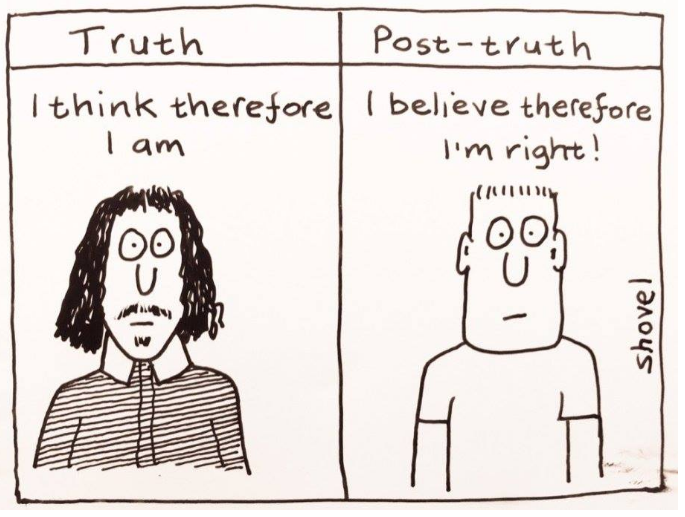The post-truth phenomenon is a concerning issue because it exerts practical and negative influence in our society. The Oxford Dictionaries named “post-truth” word of the year for 2016. Post-truth is an adjective defined by the Oxford dictionaries as “relating to or denoting circumstances in which objective facts are less influential in shaping public opinion than appeals to emotion and personal belief.”
Throughout 2016, the concept of “post-truth” has become prevalent in American politics, with individuals, including politicians and the public, resorting to personal feelings or intuition when making statements and decisions. The way the US American Presidential election and the presidential debates occurred this past year has been concerning to many: a platform which had previously allowed for productive political discussion became also a grounds for personal attack. As New York Times columnist David Brooks points out, in this year’s elections, we have seen the degradation of moral capital, or the “shared habits, norms, institutions and values that make common life possible.” “[In our societies, we] agree on a million informal restraints — codes of politeness, humility and mutual respect that…steer us toward reconciliation,” Brooks says. But when political candidates resort to personal attacks and make statements not to provide information about their policies but to reduce their opponent’s credibility, they break these codes and appeal to the public’s emotions. Even when policies are discussed or evidence is provided in support of claims, there is no emphasis on fact-checking.
This is the idea of “post-truth.” The lack of emphasis on truth. Though seen in politics, the problem also exists in other aspects of our lives: a neglect of opinions other than our own. It’s worth examining what’s contributing to polarization both in politics and in our beliefs.
Social media is one cause contributing to this problem – a Twitter post can gain as much credibility as a published journal. Because social media has become such a prevalent aspect of our lives, we are much more likely to come across a twitter post affirming a pre-existing belief than to actively seek an article advocating an opposing one. Social media increases exposure to beliefs similar to our own. Individuals whose social media profiles we follow will likely present ample statistical evidence that portrays the perspectives/actions of opposing parties in the worst light possible, and will offer facts that best support the side we support. Just like anything that goes viral on the internet or becomes popular in real life, we often see the better versions of whatever is being relayed. The reason that the system of government is such an important aspect for discussion is because it carries necessary implications for society and our social interactions.
What democracy advocates for, in part, is the equality of each person to make their own thoughts matter. Democratic societies are often also individualistic and encourage people to voice their beliefs. Social media has only magnified this: by allowing any and every one to publish their opinions regardless of whether or not they’re supported. It’s possible to extract that in a way, the significance we place in our own beliefs and our own ability to make judgements has only disinclined us further to seek criticism to our beliefs. Opinions are sometimes valued so much that we feel a need to have an opinion just because it is better than holding a neutral stance. And because we often see ideas as a part of ourselves, it is easy to take it personally when personal beliefs and ideas are attacked. Sometimes, individuals go to lengths to defend their beliefs just because they want to be right, not because they actually hold those beliefs so strongly in the first place. Emotions can prevent a genuine exchange of ideas.
One of the most immediate solutions to the post-truth phenomenon is unfortunately not a new idea. It seems that in our daily lives, simply making ourselves more aware is the most important action we can take. Challenge your opinions almost as much as you place faith in them. We hear repetitions of this idea ever so often from various people. “Put yourself in someone else’s shoes,” we hear from our parents. “Exercise critical thinking,” our teachers tell us. In order to avoid immersing ourselves in this post-truth mentality and to prevent the problems that result, the first baby step we can take is to make ourselves conscious of our biases: implicit and explicit.


![A collection of college flags. [PHOTO COURTESY OF AMBER HU ('27)]](https://blueandgoldonline.org/wp-content/uploads/2025/05/IMG_5029-1200x577.jpeg)

![An SAT word cloud. [PHOTO COURTESY OF WORDCLOUDS]](https://blueandgoldonline.org/wp-content/uploads/2025/05/SAT.jpeg)
![Collage of banned books, including “The Handmaid’s Tale” by Margaret Atwood. [MINSUN KIM/ THE BLUE & GOLD]](https://blueandgoldonline.org/wp-content/uploads/2025/04/IMG_4274-1200x681.jpeg)

![A collage of dark romance book covers from an online store for dark romance novels. [PHOTO COURTESY OF TRILOGYOFROMANCE.COM.AU]](https://blueandgoldonline.org/wp-content/uploads/2025/04/IMG_4272-1200x600.png)